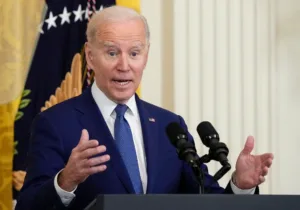In a historic June 10 vote, the US Senate confirmed Judge Zahid Quraishi’s appointment to the US District Court for New Jersey, making him the first Muslim federal judge in American history. Although the nomination received bipartisan support, an unlikely source sharply criticized Quraishi’s appointment: a leading civil rights organization that claims to speak on behalf of Muslim American interests.
According to Slate, a senior leader from the Council on American-Islamic Relations (CAIR) was “furious” following President Joe Biden’s decision to appoint Quraishi, joining a pair of anonymous sources in protesting the nomination.
“I would much rather have a white Christian judge with progressive values,” said Zahra Billoo, head of CAIR’s San Francisco branch, a supposedly non-partisan Islamic civil rights group. “It’s not enough that he is Muslim. In fact, it’s insulting,” she added.
Billoo and her allies would prefer a civil rights trailblazer, someone from an apparent “list” of “20 to 50 Muslims who have been in the fight” for social justice. CAIR’s history of civil advocacy work includes defending cop killers and terrorists, making Quraishi the “wrong” Muslim for the job.
“We don’t know what his stances are on civil rights because you can’t find one article or anything that he’s written publicly about the Muslim struggle in the last 20 years post-9/11,” an unnamed Muslim politician told Slate.
A matter of pride for most civil servants, Quraishi’s history of public and military service is alarming to CAIR, which has promoted anti-government conspiracies and vilified American service members. Specifically, Quraishi’s role as a “Detention Operations Legal Advisor” for the US Army in Iraq has “sparked concern” among CAIR officials, who issued a press release suggesting that the nominee may be guilty of underwriting prisoner abuse.
CAIR’s evidence against the judge? He served in the military “after 9/11 … at a time when Abu Ghraib was open,” the infamous American detention facility where Iraqi prisoners of war were subjected to torture, war crimes, and inhumane treatment.
However, publicly available records show that Quraishi’s first deployment sent him to Tikrit, far from Abu Ghraib, where he served as the chief of legal assistance for soldiers serving throughout northern Iraq. His supervisor called him “one of the top officers and attorneys in the division.”
What about Quraishi’s second tour in 2006, when it appears that he worked as a detention adviser to a brigade commander? Was he teaching military leaders to “skirt the law” when it came to handling prisoners, as Billoo suggested?
On the contrary, Quraishi trained soldiers on the lawful collection of battlefield evidence. “It’s been a problem with detainees being released … because pictures taken were not sufficient; sworn statements were not detailed enough; the evidence package was incomplete,” Quraishi told Stars and Stripes in 2006 as his unit prepared to rotate into Iraq.
CAIR has also questioned Quraishi’s employment with the Immigration and Customs Enforcement (ICE) agency, where he served as assistant chief counsel representing the government in political asylum cases. Holding such a position is inexcusable to the Muslim civil rights group, which expends great resources undermining US border security, even hampering ICE arrests by instructing wanted criminals on how to exploit legal loopholes to evade capture.
Despite Quraishi’s extensive history of service in military and law enforcement, it is unfair to say that he is a stranger to advocacy work. After leaving the US Army, he served as the civil rights coordinator for the special prosecutions division of the US Attorney’s Office in the District of New Jersey. He also co-chaired its diversity committee.
Apparently unimpressed, CAIR wrote to the Senate Judiciary Committee asking members to “probe” the judge’s work history. However, Quraishi’s Senate confirmation hearing only raised more doubts among his critics following his answer to an awkward question from Democratic Sen. Dick Durbin (IL).
“I’m going to follow up with a question I’m almost embarrassed to ask,” said Durbin, who chairs the committee. “What do you know about shari’a law?” he asked, referring to the broad set of religious principles dictating personal conduct among Muslims.
“I don’t know anything about that, chairman,” Quraishi answered. “I know probably less about it than you do.”
Publishing a second press release about the nominee, CAIR called Quraishi’s evasive response “disappointing” and accused Durbin of “unwittingly” holding “Islamophobic views.” The Muslim nonprofit would prefer an appointee who is willing to defend shari’a law and take non-Muslims to task for asking questions about it—even when CAIR admitted that those questions were meant to preempt bigotry.
Of course, no judicial nominee should be expected to explain complicated religious practices or serve as a spokesperson for their spiritual community. But to pretend that there is no controversy behind Islamic laws—from patriarchal inheritance practices to extreme forms of criminal punishment—is to feign ignorance of Quraishi’s motive for avoiding the subject.
Many Islamic and South Asian groups have voiced pride and support for the nomination, casting doubt on whether Slate’s “furious” Muslims represent a truly meaningful opposition. Leading up to the Senate confirmation, Islamic publications such as 5 Pillars had nothing to say about Quraishi’s credentials; social media platforms were devoid of criticism concerning the judge’s background prior to the Slate article.
So, what explains the outcry from America’s largest Muslim civil liberties organization?
CAIR officials are livid after a presidential administration that they so enthusiastically supported in 2020 chose to consult with other Muslim organizations when awarding lucrative appointments. CAIR considers itself the largest advocacy group for Muslims in America, and its leaders enjoyed privileged access to the Barack Obama administration, visiting the White House at least 20 times during Obama’s first term.
Despite its former proximity to the White House, CAIR failed to accomplish what a relative newcomer to Muslim political advocacy circles has achieved in the first months of the Biden administration. Founded in 2017, the American Pakistani Public Affairs Committee (APPAC) is loudly claiming credit for Quraishi’s nomination, insisting that it played an “instrumental role” in selecting the judge from among “dozens of potential candidates.”
APPAC claims to be dedicated to helping Pakistani and Muslim Americans run for political office, but it is also appears to be closely involved in promoting Pakistani government interests. Its members regularly meet with public officials from the Islamic Republic, and Pakistan’s foreign minister has honored APPAC Chairman Ijaz Ahmed as the “true face of Pakistan.”
If CAIR and other Quraishi critics are concerned about foreign interference in the appointment of a federal judge, they haven’t mentioned it. Instead, they are upset that “the nomination process excluded Muslim organizations committed to civil rights,” while relying on “major Democratic donors” without a “track record in human rights.”
While CAIR’s own political action committee raised a paltry $4,250 in federal donations last election cycle, APPAC gave over $1.3 million to the Biden campaign in a single August fundraiser. During this event, Biden was chummy with Ahmed, calling the APPAC chairman a “vouching force” in his community.
“Doing a heck of a job, man,” Biden told his donor. “People look to you to see who you like, because they know you know people.”
APPAC may have earned the president’s goodwill through its fundraising efforts, but its “track record” as an advocate for progressive causes is unimpeachable. In fact, it has been in the trenches with CAIR and other prominent activist groups, railing against so-called “Islamophobia” and protesting India’s response to terrorism and unrest in Jammu and Kashmir.
In a webinar series following Quraishi’s confirmation hearing, CAIR Deputy Director Edward Ahmed Mitchell predicted how the Biden administration would interact with and receive feedback from the Muslim community.” He argued that the federal government prefers “Muslim organizations who don’t rock the boat too much” and that are “very publicly solicitous of the president.”
Mitchell was implying that his organization is willing to stand up for Muslim Americans, even if it means defying progressive leaders. However, CAIR has been known to “rock the boat” in more alarming ways.
In 2008, CAIR was labeled an unindicted co-conspirator in a terror finance trial involving Hamas, and at least seven CAIR officials have been arrested, convicted, or deported on terrorism charges. Numerous government agencies have instituted policies forbidding or discouraging outreach with the organization, such as the FBI, the US Census Bureau, and the Arkansas State Legislature.
Given its past, it should come as no surprise that the Biden administration would look to other Muslim organizations—no matter how imperfect—when filling appointments. Confined to the political sidelines and desperate for attention, CAIR’s opposition to the nomination of a qualified Muslim judge is a betrayal of the same community it claims to represent.







 Live in the DC area? Sign-up for Providence's in-person events list!
Live in the DC area? Sign-up for Providence's in-person events list!